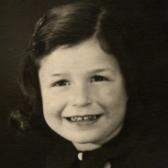
-
Learn More about Jacqueline
Jacqueline was born on April 23, 1935 in Paris, France. Her father, Frits, ran a food import-export business and her mother, Ellen, took care of Jacqueline and her older sister, Manuela.
Jacqueline had a normal childhood before the outbreak of the war in 1939, but everything changed in May 1940 when Germany invaded France. In the early days of the invasion the bombardments often forced the family to don gas masks and seek shelter in the cellar of their apartment building. Shortly after the invasion they fled to Deux-Sèvres, but returned to Paris after the armistice was signed and Jacqueline and Manuela were able to attend the local public school that September. In July 1941, the Vichy government instituted a program of “Aryanization” and although her father was forced to sell his share of the business to his non-Jewish partner, he continued to work and would hide in a back room if someone came in. In June 1942 French Jews were ordered to wear the yellow Star of David and the following month 13,000 Jews were rounded up and sent to the Drancy transit camp where most were deported to Auschwitz. Most of the roundups took place in areas of Paris with a high concentration of foreign Jews, but the Mendels lived in a primarily Catholic, French neighborhood where they were one of only a few Jewish families and the authorities did not come for them.
On 30 July 1942 the Mendels left Paris for the Vichy-controlled southern region of France, telling their daughters that they were going on a vacation so as not to frighten them. At the train station they picked up their backpacks which had been left there by two young men in the French underground. The police did not search the Mendels’ train as they had many others, but after crossing the border and arriving in Ribérac her parents were arrested and interrogated by the French authorities. They were not imprisoned but were ordered to remain within 100km of the regional capital of Périgueux. They settled in the two upstairs rooms of a house with no electricity or water in the tiny village of Le Got in Dordogne, where they lived for the next twenty-nine months. Jacqueline’s father exchanged anything of value for food, including the family radio and even Jacqueline’s doll clothes. Circumstances were more dangerous for men, especially Jewish men, as they could be conscripted for forced labor. Consequently, Frits spent most of the time hiding in the dilapidated cellar of a friendly farmer, occasionally performing some work for him in exchange for food.
In August 1943, Ellen gave birth under terrible conditions to a son they named Franklin after Franklin Roosevelt. Their situation became more precarious after the Allies landed in Normandy but when Paris was liberated, Frits was able to return to check on his business and the family’s apartment. After reclaiming their apartment, Frits returned to Le Got and in November 1944 the family returned and resumed their life in Paris. They later learned that around twenty close family members had been deported and killed in Sobibor and Auschwitz.
Jacqueline met her American husband, Richard, while he was studying in Paris. They came to the U.S. in 1958, where they married and later had two children. Jacqueline retired from the U.S. Foreign Service Institute in 2007. She volunteered at the United States Holocaust Memorial Museum.



















